
Jul 17, 2013 | News
Hundreds of participants from around the world visited Beijing for the Road Safety on Four Continents (RS4C) conference, the 16th in the series.
ChinaRAP played a high-profile role at the conference, including by participating in “Sharing Road Safety – International Workshop in Scientific Safety Estimation” (co-sponsored by Research Institute of Highway of China, Beijing University of Technology, ITF/OECD, TRB, VTI) and the “Sharing solutions for transitioning economies” workshop (co-sponsored by GRSF and the World Bank).
ChinaRAP is currently actively supporting government, World Bank and Asian Development Bank projects in Anhui, Guizhou, Henan, Liaoning, Shaanxi and Yunnan.
The event also provided the opportunity for high-level discussions with Ministry of Transport and the Ministry of Public Security officials.

Jul 17, 2013 | News
I am delighted to announce that Gary Liddle, the Chief Executive of VicRoads (an Australian state government road agency), has joined the iRAP Board.
Gary’s and VicRoads’ efforts, including delivery of the billion-dollar Transport Accident Commission (TAC)-funded Safer Road Infrastructure Program, have helped make Victoria a world-leader in road safety. In 2012, Victoria achieved its lowest-ever number of road deaths (282 fatalities / 5 per 100,000 population).
Gary also brings a wealth of experience from his work with Austroads, ARRB Group, the World Road Association (PIARC) and REAAA.
When it comes to road infrastructure, lives are not saved until safety treatments are built. We can eliminate 1- and 2-star roads and celebrate the opening of new 4- and 5-star roads.
With large-scale safety programs already saving lives in Victoria, Gary’s practical experience will help guide our work globally as we partner with road authorities, development banks and auto-clubs to achieve our vision of a world free of high-risk roads.
Rob McInerney
CEO, iRAP

Jul 16, 2013 | News
The Korea Transport Institute (KOTI) and iRAP have signed a Centre of Excellence agreement, which will support efforts in the development of road infrastructure safety in Korea as well as in the international community.
Speaking at a special seminar, KOTI Pesident, Gyenchul Kim, said: “To achieve high performance on road safety, all road safety factors including road users, vehicles, and road infrastructure should be safer than now. We are showing a high level of seat belt usage compared to 20 years ago. We are also making vehicles which compete with the other safer cars around the globe. Now is the time to make road infrastructure safer in the world.”
KOTI joins four other iRAP Centres of Excellence: ARRB Group, the Malaysian Institute of Road Safety Research (MIROS), TRL, MRIGLobal and the Instituto Mexicano del Transporte.
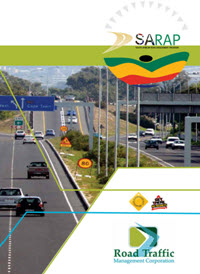
Jul 16, 2013 | News
RMTC, the lead agency for road traffic management in South Africa, has established the South African Road Assessment Program (SARAP) to help prevent the more than 14,000 road deaths that occur each year in the country.
Speaking at a major launch event, acting CEO, Collins Letsoalo said the South Africa “free of high risk roads” initiative will include:
- Assessment and performance tracking on 36,000km of road where over 50% of fatalities in South Africa occur.
- Targeted investment in proven high return treatments across the country.
- The elimination of one and two star roads by 2020.
The initiative will draw on the co-operation and dedicated support of stakeholders such as the Department of Transport, Ministry of Finance, SANRAL, SARF, Road Accident Fund, SALGA, South African Police Service, Universities and CSIR.
SARAP will also involve capacity building, evaluations, communications and employment generation efforts.
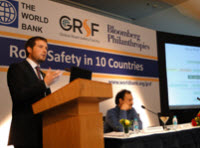
Jul 16, 2013 | News
‘Designing safer roads for all’ was the theme of a week-long road engineering safety training course held in Bangalore, India.
Participants from across India and nearby countries had the opportunity to learn about Star Rating road designs, crash investigations, road safety audits, black spot management, engineering treatments for run-off, head-on and intersection crashes, and designing for vulnerable road users and mixed traffic.
The course was closely linked with iRAP assessments, which now cover some 6,500km of roads in seven Indian States. More than 100 engineers have participated in iRAP-specific training since 2010.
Importantly, investments to improve many of the roads assessed with iRAP tools have been locked into World Bank-financed projects, estimated to be worth more than USD 3.5 billion. Designs for almost 30% of the roads assessed have already been Star Rated, helping to ensure that safety is built-in to the plans prior to construction.
The course culminated in a site visit to the Mysore safe demonstration corridor which will soon be upgraded. Visit our Flickr page to see photos of the visit.
The training course was an initiative of the GRSF and provided as part of the Bloomberg Philanthropies global road safety program.
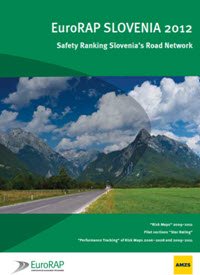
Jul 15, 2013 | News
In the first report of its kind, AMZS have brought together results from all RAP protocols for roads in Slovenia.
Risk Mapping results on 6,500km of the road network for the period 2006-2011 showed that motorways and expressways are the safest road type, with an average fatal and serious crash rate 6 times lower than main roads and 8 times lower than regional roads. Just 1% of the network fell into the higher risk categories compared to 23% of main roads and 31% of regional roads. Performance tracking over time showed a significant improvement in the proportion of the network rated higher risk compared to 2006-2008.
The report includes results from pilot road inspections covering 270km. Over 90% of the expressway routes achieved a 4-star rating, with a lack of paved shoulders identified as a key roadside hazard. Main road sections scored much lower, with the majority rated as 1- or 2-stars. Narrow driving lanes, steep embankments and poor junction layout were identified as problem areas.
A detailed Safer Roads Investment Plan on the main road from Ljubljana Kocevje-Petrina showed that improving intersection layout, widening lanes and adding paved shoulders and roadside barriers on just 32km of road would require investment of €2 million and would yield a €16 million return over 20 years, equating to a benefit cost ratio of 7.5.
The full report can be downloaded from: http://eurorap.org/media/182412/EuroRAP_SLO_2012_Eng.zip
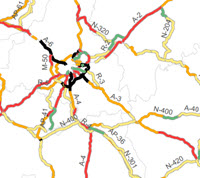
Jul 15, 2013 | News
RACC have published EuroRAP mapping showing national road sections with the highest crash costs.
The research shows that up to 20% of the network (4,700km) bears crash costs over €100,000 per kilometre, while 5% of the network (1,296km) had crash costs greater than €200,000 per kilometre. The study found that just eight roads account for half of the highest cost per kilometre.
The report comes at time of considerable budgetary constraint in Spain, and it is argued that targeted investment on road sections with the highest crash costs will save lives and money.
Currently, while the average crash cost per km on the national road network stands at €64, investment in road maintenance stands at just €38 per km.
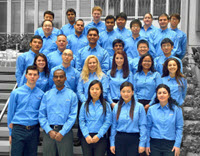
Jul 15, 2013 | News
By applying to become an IRF Fellow, you could follow in the footsteps of passionate road safety supporter and member of the ChinaRAP team, Wu Lingtao.
The IRF Fellowship Program enabled Lingtao take up study at Texas A&M University in the United States, meet some of the best international students in the country and network with leaders of the transportation industry.
The International Road Educational Foundation is now accepting nominations for the IRF Fellowship Program – Class of 2015 (starting fall semester, 2014).
The program provides a one-time graduate level scholarship to young professionals from developing countries who have strong academic backgrounds, professional qualifications, leadership potential, and a commitment to return to their respective home countries after graduation.
For more information on how to apply, visit: www.irfnews.org/fellowships.
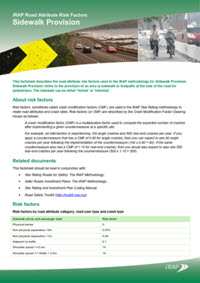
Jul 15, 2013 | News
To coincide with the first major update of the iRAP methodology since it was pilot-tested in four countries in 2006, we have published a new series of fact sheets.
The 28 fact sheets describe the risk factors (or crash modification factors) used in the models for attributes such as lane width and sidewalk (footpath) provision, and include discussion on key issues and references to published literature. The fact sheets are available at irap.org and on the Road Safety Toolkit.
We are also in the process of updating the existing methodology documents, addressing topics such as the way in which crash initiation modes are handled in the models and how the Star Rating thresholds are set. The documents will be free to download when they’re ready.
In the meantime, if you have any questions about the iRAP methodology, please contact us. We will be happy to answer your questions.
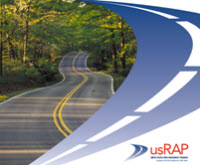
Jul 15, 2013 | News
During a recent webinar the AAA Foundation for Traffic Safety explained how usRAP is transitioning from pilot projects to become an operational program. Having demonstrated through a three-phase pilot period how it can complement existing safety management programs in...
Jun 5, 2013 | News

May 3, 2013 | Espanol news
iRAP fue reconocido por sus contribuciones a la seguridad vial en la ceremonia anual de Premios Americanos de la Región IV de la FIA.
El Director Regional de iRAP, Julio Urzua, fue reconocido por la FIA por su trabajo en la creación e implementación de iniciativas de seguridad vial para el año 2012, reafirmando los compromisos de los clubes de automovilismo de fortalecer la sinergia entre la movilidad y el transporte.
Hasta fines de 2012, se habían llevado a cabo evaluaciones de iRAP en Argentina, Belice, Brasil, Chile, Colombia, Costa Rica, El Salvador, Guatemala, Honduras, México, Nicaragua, Panamá y Paraguay.
May 1, 2013 | Report, Resources
Download Click the file icon above to download the file. 2013 iRAP report – India overview (Phase 2)
May 1, 2013 | Report, Research, Resources
Download Click the file icon above to download the file. 2013 iRAP paper – Relationship between Star Ratings and crash costs: Bruce Highway, Australia
Apr 9, 2013 | News
The 2012 iRAP Asia Pacific Star Performer award recognizes action by the Karnataka State Highway Improvement Program (KSHIP) and the World Bank to ensure that safety is built-in to designs for new roads and major upgrades, prior to construction.
The winners of the 2012 award were announced during the recent Global Road Safety Partnership (GRSP) Asia Seminar and International Road Assessment Programme (iRAP) Workshop in Manila, and a special ceremony will also be held during a Global Road Safety Facility engineering workshop in Bangalore in June.
Karnataka was the first jurisdiction in the region to commit to setting minimum Star Ratings for new road designs.
The commitment is consistent with the Commission for Global Road Safety recommendation that desired design speeds for new roads should be subject to achieving minimum safety ratings.
The steps taken to date include:
- The World Bank initially set a target of three-stars for road safety demonstration corridors included in a loan package. The Government then extended this target to include more than 500km of annuity roads.
- Road safety inspections were carried out and baseline Star Ratings calculated for the existing roads.
- Detailed supporting data, including road crash investigation data, were collected on selected roads to help establish a full understanding of the situation.
- Consulting engineers and road authority engineers used Star Ratings to test the safety impact and suitability of various safety options for the annuity, such as ‘raised pedestrian crossings’.
- Designs were developed based on optimised Star Ratings and which met local design standards and budget and environmental requirements.
- With assistance from ADB, local engineers undertook on-site reviews of countermeasures identified by iRAP for the safe demonstration corridors. This work will shape subsequent designs, but also serve as a guide for other countries implementing iRAP recommendations.
Overall, the annuity road process resulted in designs with significantly better Star Ratings than the existing roads and standard designs.
For example, the percentage of road rated one-star or two-stars for vehicle occupants would be reduced from 86% to 2%. For pedestrians, the percentage of high risk roads would drop from 100% to 12%. It was estimated that the new designs would result in 55% fewer deaths and serious injuries than currently occur.
The work in Karnataka is part of a larger program of iRAP assessments in India, designed to help reduce the estimated 231,000 road deaths that occur each year. During the past three years, almost 6,500km of roads in seven States have been assessed and more than 100 engineers have participated in training. Star Ratings are now being used to help improve the safety of designs on numerous road corridors.
iRAP in India is being delivered in partnership with Public Works Departments and local firms, and is supported by the Global Road Safety Facility and Bloomberg Philanthropies. iRAP’s activities are enabled by funding from the FIA Foundation and the Road Safety Fund.
The annual iRAP Asia Pacific Star Performer award is given to organizations that have embraced the iRAP vision for a world free of high-risk roads. Previous winners come from Malaysia, Vietnam, New Zealand and the Philippines.

Apr 4, 2013 | iRAP Asia Pacific Workshop, Presentations, Resources
The 5th annual iRAP Asia Pacific Workshop will be held on Thursday 4 April, 2013 in Manila.
As in previous years, the workshop will be held as part of the GRSP Asia Road Safety Seminar (2-3 April, 2013). The 2012 event brought together hundreds of people from more than 20 countries.
iRAP workshop participants will include road authority engineers, policy makers, automobile association staff, researchers and consultants. People will have the opportunity to:
- share their experiences in undertaking iRAP assessments
- learn about the latest iRAP model and software developments (http://vida.irap.org)
- find out about our the online training platform, RAPcapacity (http://capacity.irap.org)
- hear about innovative data collection and analysis techniques
- get the latest information on infrastructure safety techniques.
For more information, visit www.grspasia.org or email greg.smith@irap.org.
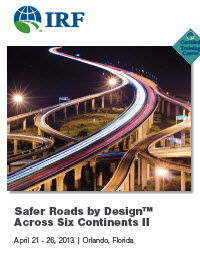
Apr 2, 2013 | Espanol news
Para aquellas autoridades que hayan completado una evaluación iRAP, el seminario “Seguridad vial a través de seis continentes”, de IRF, les puede ayudar a poner en práctica los planes para salvar vidas.
El programa de capacitación Vías Más Seguras a Través del Diseño, de IRF, es reconocido como uno de los más completos del mundo, y ayuda a las autoridades viales a comprender qué pueden hacer para cumplir el compromiso de reducir muertes durante la Década de Acción para la Seguridad Vial.
El programa de capacitación se focaliza en cuatro temas principales: seguridad en las veredas (aceras), seguridad en las zonas de trabajo, seguridad del usuario vulnerable y auditorías de seguridad vial.
Para mayor información sobre el siguiente programa, que se llevará a cabo del 21 al 26 de abril de 2013 en Orlando, Estados Unidos, visite: http://www.irfnews.org/home/ o comuníquese por correo electrónico con: Mike Dreznes (mdreznes@irfnews.org).
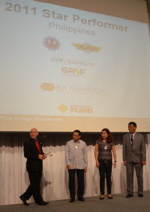
Apr 2, 2013 | Espanol news
El 5to. Taller Anual de iRAP Asia Pacífico se realizará el jueves 4 de abril de 2013 en Manila.
Como en años anteriores, el taller se llevará a cabo como parte del Seminario de Seguridad Vial en Asia, de GRSP, (2 y 3 de abril de 2013). El evento de 2012 congregó a cientos de participantes de más de 20 países.
El Taller de iRAP está dirigido a los ingenieros de caminos que laboran en las autoridades de transporte, a los formuladores de políticas, al personal de las asociaciones de automovilismo, investigadores y consultores. Los participantes tendrán la oportunidad de:
• compartir sus experiencias en la realización de evaluaciones iRAP
• aprender acerca del último modelo iRAP y desarrollos de software (http://vida.irap.org)
• conocer nuestra plataforma de capacitación en línea, RAPcapacity (http://capacity.irap.org)
• enterarse de las técnicas innovadoras para la recolección y análisis de datos
• obtener la última información sobre técnicas para la seguridad de infraestructuras.
Para mayor información, visite www.grspasia.org o envíe un mensaje electrónico a greg.smith@irap.org.
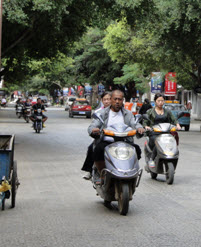
Apr 2, 2013 | Espanol news
Con el apoyo de GRSF y de Bloomberg Philanthropies se están encontrando oportunidades para que las vías de Brasil, China, Egipto e India sean seguras.
En Brasil, el vehículo “Ángel Naranja”’ ha llegado para que conjuntamente con el vehículo “Ángel Brasileño” puedan inspeccionar las vías.
En China, se están finalizando los resultados de las evaluaciones de dos ciudades de Yunnan y están en marcha las evaluaciones de vías rurales en Shaanxi. También se están elaborando planes para la evaluación de vías en la ciudad de Dalian.
En Egipto, el Ministro de Transporte ha respaldado los planes de evaluación de vías de alto riesgo.
En India, se dispone ahora de la línea de base de la Clasificación por Estrellas para las vías de Andhra Pradesh, Kerala, Karnataka, Gujarat, Rajasthan, Assam y Haryana, y se está evaluando el diseño de las vías con el objetivo de lograr al menos 3 estrellas para todos los usuarios de las vías.

Apr 2, 2013 | Espanol news
En México, cada día mueren más de seis niños en el camino hacia su colegio. iRAP se está asociando con Safe Kids Mexico para ayudar a crear ambientes más seguros para los niños que van caminando al colegio y vuelven a sus casas del mismo modo.
En una escuela de la ciudad de México se está realizando un proyecto piloto en respuesta a una serie de colisiones graves en las calles vecinas, que han demandado acción inmediata.
Con la University of North Carolina, iRAP está desarrollando una herramienta que permitirá que las comunidades de todo el mundo puedan evaluar las vías alrededor de las escuelas mediante la Clasificación por Estrellas, lo que generará planes de seguridad.
El proyecto cuenta con el apoyo del Fondo de Seguridad Vial.
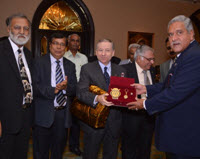
Apr 2, 2013 | Espanol news
El Presidente de la FIA Jean Todt y el Presidente de la FIAA Nitin Dossa vieron recientemente de primera mano los esfuerzos que se han realizado para mejorar la seguridad en uno de los países más populosos.
A través de la Campaña de Acción para la Seguridad Vial y sus clubes miembro, la FIA está trabajando para ayudar a reducir las muertes en las vías de la India, donde se estima que se producen más de 200,000 muertes cada año.
Los funcionarios del gobierno de Mumbai tuvieron la oportunidad de ver el vehículo de inspección que se usa en las evaluaciones del iRAP en siete Estados, revisaron los resultados de investigaciones detalladas de muertes en las vías y consideraron evaluaciones de seguridad para vías de alta prioridad, como la carretera Mumbai-Goa que fue escenario de una horrible colisión que recientemente causó la muerte de 37 personas.

Apr 2, 2013 | Espanol news
Como parte de los esfuerzos para frenar el número tremendamente alto de muertes y lesiones graves en las vías, el Banco Asiático de Desarrollo (ADB), el Bangladesh Roads and Highways Department (RHD) y el iRAP han evaluado las vías que representan la columna vertebral del sistema de transporte de la nación.
Las evaluaciones se hicieron como parte del primer “proyecto de seguridad vial” del ADB lo que asegurará que se adopten los programas más urgentes y rentables como parte integral de la política de seguridad vial del gobierno.
Durante el proyecto, se estimó que las muertes y lesiones graves ocurridas en los 1,300 km de vías evaluadas costaron más de US$300 millones cada año.
La mayoría de las vías evaluadas están calificadas en la banda de más alto riesgo: 1 o 2 estrellas. Las razones son claras e incluyen el hecho de que 80% de las vías que usan los peatones carecen de veredas (aceras) formales.
Sin embargo, los planes de inversión para vías más seguras preparados durante el proyecto presentan soluciones igualmente claras. La construcción de 75 km de veredas en la N4, por ejemplo, podrá prevenir más de 3,000 muertes y lesiones graves por 20 años, lo que ahorrará US$40 millones en costos debido a colisiones.
El informe técnico del proyecto está disponible para ser descargado.
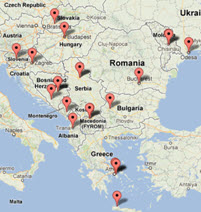
Apr 2, 2013 | Espanol news
El proyecto SENSOR, de dos años de duración, agrupa a 14 países y es el resultado de una excelente cooperación entre los clubes de automóviles, universidades y autoridades viales.
La mayoría de los países del Sudeste de Europa están construyendo nuevas vías o rehabilitando las existentes para obtener los beneficios de una mejor movilidad. SENSOR facilita que estos países usen las técnicas del iRAP para canalizar la inversión a fin de que puedan elevar el nivel de seguridad vial y lo puedan cuantificar.
SENSOR está cofinanciado por South East Europe (SEE) Transnational Cooperation Programme y la Unión Europea.
Apr 2, 2013 | Espanol news
La University of Birmingham está ofreciendo un curso práctico sobre iRAP para ingenieros de seguridad vial, gerentes y otros profesionales del sector.
Este primer curso, que cuenta con la colaboración del iRAP, incluye ejercicios prácticos, discusiones y exposición al software del iRAP. El curso de cinco días (del 2 al 6 de septiembre de 2013) se dictará en instalaciones que usan tecnología de vanguardia para la enseñanza y el aprendizaje.
Se espera que al finalizar el curso los participantes habrán adquirido conocimientos sobre:
- Los fundamentos del enfoque del iRAP para la evaluación y mitigación de riesgos.
- Los conceptos de mapeo de riesgos y el monitoreo del desempeño.
- El concepto de clasificación por estrellas con base en los datos de inspección y diseño de las vías.
- Los principios que deben guiar el plan de inversiones para construir vías más seguras.
- Software del iRAP.

Mar 21, 2013 | News
With the support of the GRSF and Bloomberg Philanthropies, opportunities to help make roads in Brazil, China, Egypt and India safe are being found.
In Brazil, the ‘Orange Angel’ vehicle has arrived to join the ‘Brazilian Angel’ vehicle in surveying priority roads.
In China, assessment results for two cities in Yunnan are being finalized now and assessments of rural roads in Shaanxi are underway. Plans are also being shaped for assessments of roads in Dalian city.
In Egypt, the Minister of Transport has endorsed plans assessments of high-risk roads.
In India, baseline Star Ratings are now available for roads in Andhra Pradesh, Kerala, Karnataka, Gujarat, Rajasthan, Assam and Haryana, and road designs are also being assessed with the goal to achieve at least 3-stars for all road users.



































